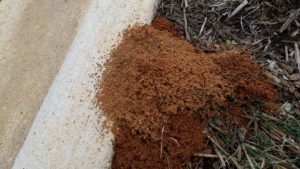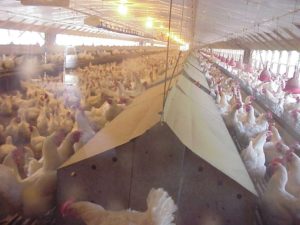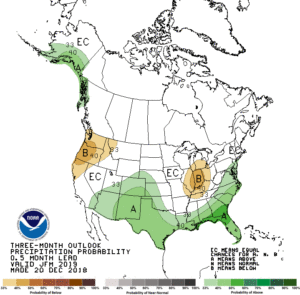Fire Ants, Chicken Litter, and Rain
go.ncsu.edu/readext?573154
en Español / em Português
El inglés es el idioma de control de esta página. En la medida en que haya algún conflicto entre la traducción al inglés y la traducción, el inglés prevalece.
Al hacer clic en el enlace de traducción se activa un servicio de traducción gratuito para convertir la página al español. Al igual que con cualquier traducción por Internet, la conversión no es sensible al contexto y puede que no traduzca el texto en su significado original. NC State Extension no garantiza la exactitud del texto traducido. Por favor, tenga en cuenta que algunas aplicaciones y/o servicios pueden no funcionar como se espera cuando se traducen.
Português
Inglês é o idioma de controle desta página. Na medida que haja algum conflito entre o texto original em Inglês e a tradução, o Inglês prevalece.
Ao clicar no link de tradução, um serviço gratuito de tradução será ativado para converter a página para o Português. Como em qualquer tradução pela internet, a conversão não é sensivel ao contexto e pode não ocorrer a tradução para o significado orginal. O serviço de Extensão da Carolina do Norte (NC State Extension) não garante a exatidão do texto traduzido. Por favor, observe que algumas funções ou serviços podem não funcionar como esperado após a tradução.
English
English is the controlling language of this page. To the extent there is any conflict between the English text and the translation, English controls.
Clicking on the translation link activates a free translation service to convert the page to Spanish. As with any Internet translation, the conversion is not context-sensitive and may not translate the text to its original meaning. NC State Extension does not guarantee the accuracy of the translated text. Please note that some applications and/or services may not function as expected when translated.
Collapse ▲The new year has brought several new questions to the Extension office. I thought the three questions and answers below would be of interest to you. However, as always, if you have agricultural questions, please contact us at the N.C. Cooperative Extension, Caldwell County Center.
Question: I found four fire ant mounds close to the road near my house. How can I control them?
Answer: Seventy-five of the one hundred counties in North Carolina are home to red imported fire ants (RIFA). The ants have been spreading outward from Wilmington since they became established in 1957. Caldwell County, for regulatory purposes, is still considered free of RIFA. Unfortunately, we are starting to see RIFA mounds showing up in the county.

Fire ants make a distinctive mound. They like to build their mounds next to concrete pads, sidewalks, and electrical transformers.
All of Catawba and portions of both Alexander and Burke Counties have been quarantined by the N.C. Department of Agriculture and Consumer Services for RIFA.
Although it will be just a matter of time before they are here, it does make sense to control them as they attempt to get a foothold here. I think the best way to control a few mounds is with an insecticidal drench. Basically, an insecticidal drench is a mixture of water and insecticide that is poured into and around the mound. There are directions on the pesticide label for how to make this mixture and how much to apply based on the mound size. Always read and follow the label directions when using pesticides.
Once fire ants are established, fire ant baits are more effective. However, before they are established, treating individual mounds is a better option because it protects our native ant populations. Native ants actually help slow the spread of fire ants because they compete with them.
Question: Are there regulations about spreading chicken litter?

Commercial poultry farms provide high quality protein in our diets. These laying hens also produce poultry litter, a great fertilizer source.
Senate Bill 1217 addresses the land application of dry recycled poultry bedding (commonly known as poultry litter) from flocks with greater than 30,000 birds. Poultry litter is a valuable nutrient resource for farmers. Poultry litter helps plants grow by acting as a slow release fertilizer and improves the soil with organic matter.
Even though poultry litter is good for plants, it is possible to get too much. Regulations are in place to prevent over application of this resource. Over application can cause these plant nutrients to get in the streams and lakes. Regulations are designed to allow land application that promotes optimum crop growth for farmers but prevents the pollution of streams and rivers.
The regulations require farmers to sample the poultry litter to determine its nutrient content. Nutrient content varies widely. Broiler litter is highest in nutrients, and mature laying hens are lowest in nutrient content.
The applicator should also take soil samples. Once the farmer knows the nutrient content of the litter and the needs of the soil, the proper amount can be applied to the fields. Typical application rates are one to four tons of poultry litter per acre.
In addition, litter should not be stockpiled within 100 feet of perennial streams or groundwater wells. Also, stockpiled poultry litter should not be covered after 14 days. Litter that is left uncovered can have the nutrients leached out by rain.
Citizens with concerns are always welcome to contact the Caldwell Extension Center. The regulatory authority for poultry litter application is the NC Department of Environment.
Question: Will this rain and wet weather ever stop?
The three-month forecast from the National Weather Service’s Climate Prediction Center is that Caldwell County will have above normal precipitation for January, February, and March.

Three month precipitation forecast. The forecast is a deviation from average seasonal precipitation.
They also predict below normal temperatures for the next three months.
These long term forecasts are surprisingly accurate, so don’t put away your rain boots just yet. I think you’ll need them for the foreseeable future.




